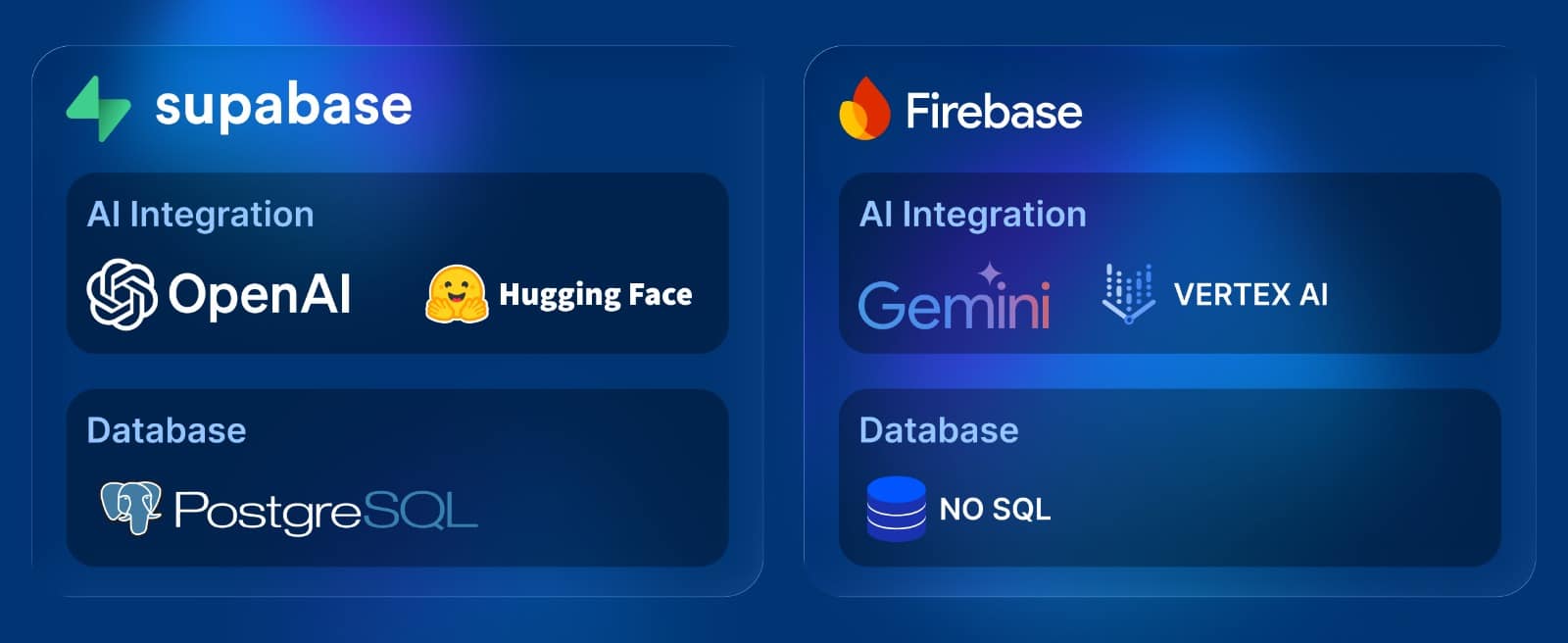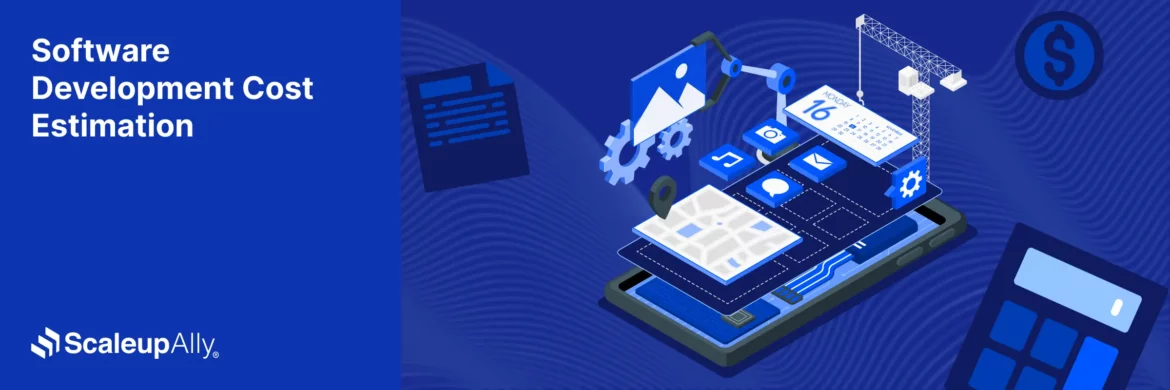Supabase vs Firebase: Which Backend Platform is Right for Your Business?
ScaleupAlly Team | August 28, 2025 , 11 min read
Supabase vs Firebase: Which Backend Platform is Right for Your Business?
ScaleupAlly Team | August 28, 2025 , 11 min read
Table Of Content
In today’s fast moving and technical world, where we are dealing with real-time data and various types of scalable architectures, every potential user wants a backend system where their online work can run flawlessly and smoothly. Whether its a startup based on medical, education, ecommerce, or a large-scale platform, having a backend that is quick to set up, developer-friendly, and highly scalable is crucial and important.
That’s exactly the case where Supabase comes into the picture. Supabase is an open-source alternative solution for firebase that is powerful and offers Backend-as-a-Service (BaaS) which is built on PostgreSQL. It enables you to build modern web and mobile apps with real-time capabilities, authentication process, quick RESTful and GraphQL APIs, and much more – this all can be simply achieved without managing complex and complicated infrastructure.
In this blog, we will walk you through how to integrate Supabase with Laravel to build a modern, scalable backend system for your app – it may be e-commerce, SaaS, or any content-driven platform, supabase will help you there.
Choose Supabase if you need to handle various numbers of APIs without incurring extra fees. Its working is based on PostgreSQL, it’s a Backend-as-a-Service (BaaS). It’s a cloud based platform which provides various features like – database, storage, authentication, realtime, edge functions etc. Below is the basic comparison between Supabase vs Firebase.
| Feature | Supabase | Firebase |
|---|---|---|
| Database Type | Uses PostgreSQL (SQL) | Uses Firestore & Realtime DB (NoSQL) |
| Open Source | Yes | No |
| Hosting & Functions | Integrated via Edge Functions | Integrated via Firebase Cloud Functions |
| Authentication | Built-in, customizable | Built-in, Google Identity integration |
| Real-time Support | Yes, via PostgreSQL replication | Yes, via Firebase Realtime Database |
| Row-Level Security (RLS) | Yes | No |
| Pricing | Predictable, usage-based | Free tier, potentially expensive at scale |
| AI Integration | Early support via APIs | Native integrations via Google Cloud AI |
| Vendor Lock-In | Minimal (self-host possible) | High (tied to Google ecosystem) |
| Best For | SQL-based apps, full control, enterprise needs | Real-time apps, fast MVPs, startups |
This is one of the biggest challenges to find out and then decide which platform will best suit our requirements. when choosing a BaaS platform and getting the understanding of how much control you can retain over your app’s backend. So if we point out Firebase first, it’s a fully managed and functional, proprietary based solution by Google, which means you can easily rely heavily on their ecosystem. It’s a google’s mobile application based platform which helps you to build, improve and grow. While this brings stability, it also introduces and provides a vendor lock-in facility. Also keep in mind that migrating away from Firebase later can be complex and expensive.
On the other hand, Supabase is open-source and provides developers more flexible space to work with. It’s very simple to use, you can do self-hosting of your own instance in Supabase, as it ensures complete ownership and control of your infrastructure. This ability of Supabase makes it an ideal choice for business concerns with various types of compliance, and long-term cost control or sovereignty.
Supabase uses PostgreSQL, which is widely used and is an open source relational database. Developers with SQL experience can hit the ground running. Firebase’s NoSQL approach can be faster for certain real-time applications, but it lacks complex relational features.
Data security and architecture play a critical role in backend platform selection. A strong architecture ensures robust data protection and better scalability. so , selecting a right platform is necessary for a user to access securely.
Overall, Supabase offerings are more predictable, managing robust data management with traditional RDBMS strengths, while Firebase excels in real-time unstructured use cases.
Firebase performs well in the factors of scalability and speed. It has serverless infrastructure which automatically gets scaled with demand, it also integrates in a smooth manner with Google Cloud services. Easily manageable for Startups which can launch quickly and grow without worrying about backend infrastructure.
However, firebase entailed itself with a service of the cost of vendor lock-in. As when connecting with firebase, you make your app, surrounded by google tools and systems. It’s fine to get started with firebase, but difficult to get released or switch to other platforms. You might need to rewrite lots of code as firebase uses a different methodology from others. It’s not easy to export your data from firebase so it’s painful in later stages. You can build apps on Google’s ecosystem, but moving out later often requires painful and significant refactoring.
Supabase provides strong horizontal scalability with PostgreSQL and it can handle growth very well. Edge Functions used here for running serverless code closer to users. In Supabase, your apps feel faster, there is no such vendor lock-in system. It gives flexibility in speed and control. It also allows self-hosting, and minimum lock-ins. It supports complex enterprise-grade applications with better observing tools and monitoring services.
Pricing is one of the most debated aspects of Supabase vs Firebase.
For apps with complex queries or growing data, Supabase may be more cost-efficient and helpful over the time. Whereas Firebase’s cost structure can be painful with the increase in user activity.

With AI transforming app development, the choice of backend should consider AI integration capabilities. For firebase, it excels in google ecosystem with rapid development whereas Supabase provides flexible open source alternative choice.
So the choice between Firebase and Supabase depends on the needs of the project. If your business relies heavily on Google AI services, Firebase has a head start. But for open, flexible AI workflows or integrating custom models, Supabase will be the better choice.
See how different industries might lean:
As we have gone through this article, we have learned that choosing between Firebase and Supabase in 2025 depends on your business goals, team expertise, and future scalability plans. Firebase is great for rapid development, prototyping and real-time apps, while Supabase empowers developers with SQL, open-source transparency, and deeper control. Evaluate not just the present needs, but your future growth trajectory.
Q: Which is better: Supabase vs Firebase?
A: It all depends on your project needs. Firebase is better for real-time,Google-integrated applications whereas Supabase is ideal for structured, SQL-based, secure, and enterprise-level applications.
Q: Is Supabase more secure for enterprise use?
A: Yes. Supabase uses PostgreSQL with Row-Level Security, providing fine-grained access control. It’s a strong choice for data-sensitive and regulated industries.
Q: Can Firebase scale with my growing team and user base?
A: Absolutely. Firebase is built on Google Cloud and scales effortlessly, but as the use case increases, pricing may effect and vendor lock-in should be monitored as your usage increases.
Author Spotlight
Kiran Saklani, Software Engineer
Related Blogs

Top 20 Emerging Technologies of 2026
Discover the top 20 emerging technologies of 2026. Explore which innovations are driving change across healthcare, finance, manufacturing, and other crucial industries.
ScaleupAlly Team
Dec 16 ,
9 min read

Software Development Timeline: Phases, Duration & Estimation Guide
Understand the software development timeline with phase durations, key factors, hidden delays, and practical methods to estimate project time.
Suprabhat Sen
Nov 29 ,
16 min read

Software Development Cost Estimation Guide: What’s Included & What Affects the Price
Explore software development cost components, major pricing factors, and practical estimation methods to plan your project accurately from start to finish.
Suprabhat Sen
Nov 29 ,
14 min read

